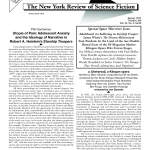 Phil Gochenour’s essay “Utopia of Pain: Adolescent Anxiety and the Ideology of Narrative in Robert A. Heinlein’s Starship Troopers” in the Space Warriors issue of the New York Review of Science Fiction (#269) is an excellent and illuminating piece of criticism. Rather than ask which moral transgression the author is guilty of, a popular game, but not necessarily a useful one, we are asked to consider what sort of ideal the characters are being pointed towards.
Phil Gochenour’s essay “Utopia of Pain: Adolescent Anxiety and the Ideology of Narrative in Robert A. Heinlein’s Starship Troopers” in the Space Warriors issue of the New York Review of Science Fiction (#269) is an excellent and illuminating piece of criticism. Rather than ask which moral transgression the author is guilty of, a popular game, but not necessarily a useful one, we are asked to consider what sort of ideal the characters are being pointed towards.
It is an ideal that comes from within Heinlein as imaged for adolescent males. One which fosters the separation from the mother and the development of a self view in which the boy becomes a man, where the military replaces the family, and challenging replaces protecting.
Typically we think of utopia as a place free from hardship, but Gochenour shows how the hardship of military life can appeal to young males. Women, both mother and potential mates, are seen source of considerably turmoil and discomfort, which is effectively neutralized by either distance or the enforcement of rigid protocols.
The nuclear family is replaced by a military one, and where the goal of the mother is to keep the boy from moving into the world and thus away from her, the goal of the mother-surrogate (Sergeant) is to perform all the same nurturing acts, except “to baby them.”
It makes sense. A hero dies but once, but intimacy is a never-ending existential threat.
There’s more to his essay, and I hope I’ve gotten these parts close enough to correctly convey his gist.